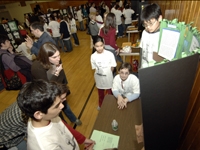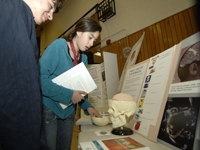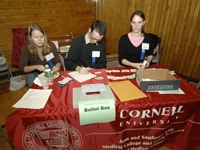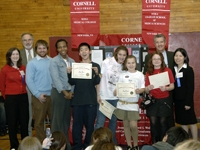
A guest judge at the Cornell Science Challenge Fair considers a presentation from a group of student scientists.
One hundred and fifteen seventh-grade students from East Side Middle School piled into the basement gym at Olin Hall on Wednesday, March 8, to present their research findings on some of life's bigger questions: Who has a better memory, boys or girls? Does the color of food affect how it tastes? Can listening to music help students study?
Students presented their work as part of the Ninth Annual Cornell Science Challenge Fair, the culmination of a mentorship program that connects the seventh-graders with faculty, graduate students and postdoctoral fellows from Weill Cornell, Sloan-Kettering and The Rockefeller University to assist them on the finer points of the scientific method. But it was clearly the students' work that was on display.
"The students came up with the idea," said Aditya Venugopal, a mentor and first-year graduate student at Weill Cornell. "I helped on a few little things, giving them tips in the right direction."

Seventh-graders Evan Kirshmer and Dominique Roses review details of their project on sound and memory.
According to Alicia Pilgrim, the students' teacher at East Side, students study the scientific method in the fall, learning the basics of observation, forming hypotheses and conducting experiments. The students then break into small groups to brainstorm ideas and investigate the mysteries of their universe.
"They are very interested in gender differences," said graduate student Michael Bruno, who co-chaired the student committee that organized this year's event. "I mean, they are 12 years old, its boys vs. girls."
But even in that respect, the designs were scientific. In the project "Does Gender Affect Memory," students tested the following hypothesis: If gender is related to memory, then girls will remember more than boys will.
Seventh-grader Alison Wong said the project "wasn't sexist," but was based on established memory research and that even the boys in the group agreed the girls probably had better memories after reviewing the research. Using a set pattern of 22 images, the team tested which gender could recall the most after 30 seconds of observation. The students found that gender had no significant effect on memory.
"It was fun testing our hypothesis," said Wong. "I actually wanted to learn about this."
Other projects were born out of real-life situations. "Does the Color of Food Affect the Perception of Taste," which used common foods dyed with coloring, was inspired by the Heinz marketing campaign that introduced green, pink, and other colored ketchups across the country in 2000.
"It came from the old saying 'don't judge a book by its cover,'" said Max Myirsk, a student on the project. Overcoming obstacles along the way ("Little technical difficulties, like forgetting the oatmeal at home"), the team members found that, for the majority of students, color had little effect on the taste of foods.
The Cornell Science Challenge was started in 1997 by two Weill Cornell graduate students who saw the program as mutually beneficial; mentors would have the opportunity to see what was happening in the community and how science was both perceived and taught, while students would receive expert training beyond what is traditionally available in New York City classrooms.
"The point is to have the students learn the scientific method as it is needed to help them in their personal lives and at whatever profession they may choose," says Dr. Sara Glickstein, one of the co-founders of the Cornell Science Challenge and currently an instructor in the Department of Neurology.
Now in its ninth year, the program has expanded tenfold and regularly provides at least two dozen mentors for more than 100 students. And the students, at least, see no limit to what the program can achieve.

Organizing-committee members Andrea Anantharam, Peter Jordan and Imke Ehlers tally the votes for the People's Choice award.
"One year I had a group that wanted to clone a gene and make genetically modified plants," says Deirdre McGarrigle, a graduate student and co-chair of the organizing committee. "The kids come up with fantastic ideas, so we need to help them find the question they are interested in and then think of a practical way of examining that question for their level of expertise and timeframe."
Of course, some students knew exactly what they would do if they could only break free from the practical constraints of a seventh-grade classroom.
"It's not like it's taken so seriously," said Dominique Roses, who was on the "Sound/Memory" team that was runner-up for most creative project. "If it was an experiment for the government, we would have done a much better job. We would have increased our sample size."

Student winners of the Best Scientific Method award with (from left) Deirdre McGarrigle, graduate student and event co-organizer; Dr. Joel Pardee, associate dean of the Graduate School of Medical Sciences; Michael Bruno, graduate student and event co-organizer; Alicia Pilgrim, East Side Middle School teacher; Max Gomez (second from right), medical reporter for WNBC-TV Channel 4 News; and Dr. Xiaoai Chen (far right), director of the Office of Outreach & Fellowships at the Graduate School.
2005 Cornell Science Challenge Winners
Awards were presented by Dr. Max Gomez, medical reporter for WNBC-TV Channel 4 News and a former postdoctoral fellow at The Rockefeller University.
Best Scientific Method: "Can You Tell the Difference Between Tap, Bottled and Distilled Water?"
Stacey Levtsenko
Amanda Stern
Jerry Chen
Danielle Imbriano
Most Creative: "Does the Word Affect One's Ability to Recognize the Color of the Word?"
Emily Lam
Remy Stern-Beckerman
Lily Chiu
Ben Steele
Matija Cupac
Best Presentation: "Does Music Improve Memory When Studying for a Reading Comprehension Test?"
Jessica Tenenbaum
Doris McGill
Brian Yan
Kalea Shuler
Besnik Vinovic
Tyler White
Taliek Singletary
Junior Judge: "Is Plant Growth Affected by Musical Stimuli?"
Rachel Mandel
Reza Malek
James Zebooker
Penelope Vargus
Kim Kyu Young
Best Scientific Method Runner-Up: "Does pH of Water Affect the Growth of Plants?"
Evan Espinoza
Alaina Halpin
Amanda Wong
Yamato Hart
Daniel Kallick
Most Creative Runner-Up: "Sound/Memory"
Dominique Roses
Nomi Zimmer
Caner Yildiz
Evan Kirchmer
Shayne Courtemanche
Best Presentation Runner-Up: "Does the Type of Music Playing Affect Short-Term Memory?"
Danielle Grigorovich
Julien Simom
Tommy Su
Susanna Chu
Esther Choi
People's Choice: "Does the Brightness of Light Affect Visual Acuity?"
Natali Ortiz
Lori Ettinger
Bilan Haji-Mohamed
Lyvasco Fough
Amy Xu
Photos by Amelia Panico.

